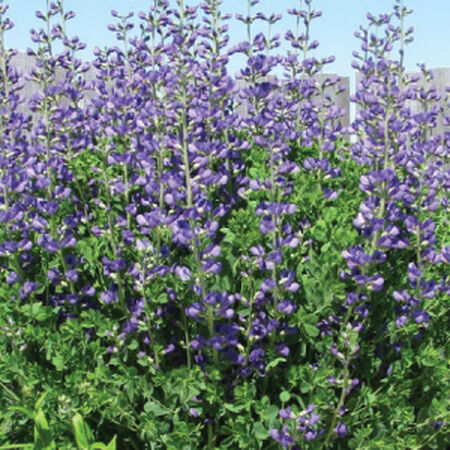Blue Indigo, Baptisia Seeds
Out of Stock
Key Attributes
Key Attributes
Product Details
Plant Height
2-3'Botanical Name
Baptisia australisSeed Type
SeedSeeds Per Gram
60Seeds Per Pound
27,200Packet
25 SeedsSow Depth
1/4"Seeds Per Ounce
1,700Breed
Open-pollinatedSun
Full SunLife Cycle
PerennialSow Method
TransplantCategories
FlowersDays To Maturity (# Days)
85Components
Growing Instructions
![]() Learning Download: How to Grow Baptisia
Learning Download: How to Grow Baptisia
Baptisia, also Blue Indigo or False Indigo, is an excellent option for beginning gardeners because it is an easy-to-care for perennial. Although it is a perennial flower, the dense leaves can give it a shrub-like appearance, which makes it an excellent landscape filler.
Before Planting: Baptisia does best when grown in well-drained soils in USDA Hardiness Zones 5-9. Be sure to select a spot in your garden where you known Baptisia is going to stay because it doesn’t transplant well.
Planting: It is best to plant fresh seeds, but it planting hardened seeds, store in the refrigerator for 6 to 10 weeks before planting. Then, scarify the seeds by wearing them down with sandpaper or cutting them slightly with a knife and then soak the seeds in water for 24 hours and begin them indoors.
Watering: Be sure to keep the soil moist.
Fertilizer: Use a balanced fertilizer in the spring and some supplemental fertilizing in the summer.
Days to Maturity: Baptisia will begin to bloom mid-April and will last until fall.
Harvesting: Baptisia foliage, along with its blooms, can make for great contrast and add a different height when arranged in bouquets.
Tips: Never add lime to your soil near Baptisia since it prefers slightly acidic soil to grow in.
Shipping Schedule
Our Seed Promise
 "Agriculture and seeds" provide the basis upon which our lives depend. We must protect this foundation as a safe and genetically stable source for future generations. For the benefit of all farmers, gardeners and consumers who want an alternative, we pledge that we do not knowingly buy or sell genetically engineered seeds or plants.
"Agriculture and seeds" provide the basis upon which our lives depend. We must protect this foundation as a safe and genetically stable source for future generations. For the benefit of all farmers, gardeners and consumers who want an alternative, we pledge that we do not knowingly buy or sell genetically engineered seeds or plants.
The mechanical transfer of genetic material outside of natural reproductive methods and between genera, families or kingdoms, poses great biological risks as well as economic, political, and cultural threats. We feel that genetically engineered varieties have been insufficiently tested prior to public release. More research and testing is necessary to further assess the potential risks of genetically engineered seeds. Further, we wish to support agricultural progress that leads to healthier soils, to genetically diverse agricultural ecosystems, and ultimately to healthy people and communities.
To learn more about the "Safe Seed Pledge" please visit www.councilforresponsiblegenetics.org.

